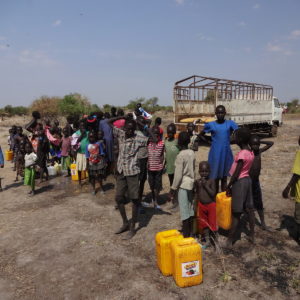June 20 is World Refugee Day, and outside cursory nods in the news, most probably aren’t aware of its significance. In a way it’s sadly fitting – increasing global instability has led to the worst refugee crisis in history, while the importance of the issue to the American public has only declined. In the deluge of the 24-hour news cycle, our failure to address the largest humanitarian crisis in a generation has slipped into relative obscurity.
The severity of the global refugee crisis is real, and growing. Conflicts around the world have intensified forcing more than 65 million people to flee their homes due to violence and persecution. Nearly 23 million of those are refugees, often languishing in reluctant host countries unable to meet basic needs and facing violence and exploitation. Most are women and children, making them especially vulnerable.
The vast majority of refugees have little hope of safely returning to their home country, and less than 1 percent have the chance to be resettled in a new country. Existing humanitarian efforts have done little to alleviate the worsening crisis, and governments across the world are reducing their commitments to refugees. The United States, once the leader in refugee resettlement, expects no more than 23,000 refugees to be resettled this fiscal year, and further reductions are anticipated next year. As the crisis escalates and refugee resettlement collapses, few have taken notice.
The waning influence of the refugee crisis is understandable in some regards – there are new domestic and international crises every day, and one issue can’t be expected to perpetually captivate the country. Yet that doesn’t fully explain the inaction and apathy in Washington. We are living through an unprecedented crisis and have failed to offer anything close to an adequate response – despite a strong historical precedent.
The United States has long been the foremost champion of refugees. For decades elected officials worked together to ensure our commitment to humanitarianism was honored – often when it was less popular with the public than today – resulting in more than 3 million refugees being welcomed throughout the country.
But after decades of bipartisan support, refugee resettlement suddenly became a politically divisive issue. Elected officials who previously supported the program began denouncing it, and erstwhile advocates fell silent. Years of spurious claims and outright falsehoods made by opponents of refugee resettlement have taken root. While such claims are often easily disproven, they serve their purpose well – refugees are now considered a politically toxic issue.
We, as a country, are failing to hold elected officials accountable for a serious moral failure: a seemingly complete disregard for the worst refugee crisis in history. Emboldened critics have continued their attacks on refugee resettlement with little to dissuade them – the abrupt classification of refugees as an unpalatable issue has been tacitly accepted, and there are far too few influential voices demanding action and challenging dubious claims. After the initial public enthusiasm for refugees subsided, politicians began shirking vocal support for the refugee resettlement program.
We must demand action, because it appears many of our elected officials are unwilling voluntarily to continue the humanitarian legacy of the United States. We cannot allow refugees to be forgotten, nor should they be viewed as politically toxic. The global refugee crisis deserves to be recognized not only now, but every day as we return the issue to the forefront of our national dialogue and compel Washington to act.

